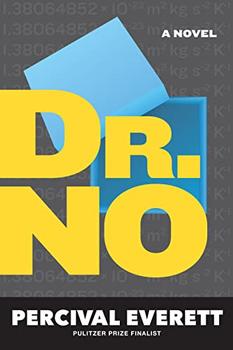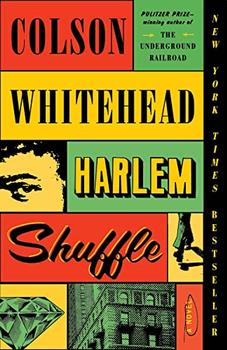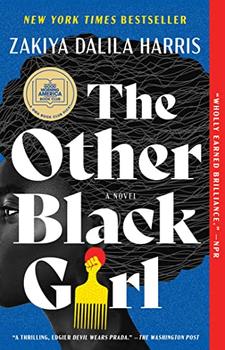Summary | Excerpt | Reviews | Beyond the book | Read-Alikes | Genres & Themes | Author Bio

 Book Reviewed by:
Book Reviewed by:
Chloe Pfeiffer
Buy This Book
Percival Everett's novel Dr. No follows Wala Kitu, a professor of mathematics at Brown University whose field of study is "nothing," i.e., whatever existed before the Big Bang, and whatever the universe is "expanding into, through, and/or toward." Wala is a genius, but his laborious search for nothing has so far been fruitless. "Nothing" is not anti-matter, dark matter, zero, emptiness or the absence of something. It is a great joke. Everett milks the ensuing wordplay for over 200 pages: "I work very hard and wish I could say that I have nothing to show for it." "I was a charlatan. I knew nothing. But given that was my chosen topic, I was a successful fraud." "'Nothing seems to bother you.' 'Actually, nothing bothers me all the time.'"
Wala is soon approached by John Milton Bradley Sill, a billionaire and self-proclaimed "James Bond villain," who could use his expertise. Sill believes the American government has "nothing" in Fort Knox—in addition to all the bullion—and wants Wala to help him steal and use it. Wala is well aware of the practical applications of nothing, which, when it comes into contact with something, makes that something "cease to exist." Still, he's intrigued. Sill cuts him a check for three million dollars to keep him on retainer.
Sill's plan, as Wala puts it later, is to "make America nothing again," as payback for the deaths of his parents, who were inadvertent witnesses to a conspiracy behind the assassination of Martin Luther King, Jr. (see Beyond the Book). His father was killed by James Earl Ray, the man convicted of assassinating King, and his mother was killed years later by the chief of police who, in the world of Dr. No, was really the man that shot King. At one point, Sill visits prison to confront Ray, who claims the FBI was behind the assassination, but who is no less guilty by association. "America will pay," Sill tells Ray. "I'm going to take your world."
It's a sympathetic origin story, and there's the question of whether the roles haven't been reversed: Maybe Sill, whose plan could be construed as aligned with racial justice, and who Wala says looks like "an upper crust English spy… with an on-and-off-again messiah complex" is more James Bond than Bond villain. Meanwhile, the Bond supervillain moniker Dr. No, which is never actually used in the book, could just as well apply to Wala in his position in the mathematics department.
But Sill is definitely evil. He has a complex with a shark tank and sexy fembots, plus he kills people. Worse, he's a philistine. His mansion in Miami is filled with ostentatious signifiers of wealth, including the real Mona Lisa, which he stole from the Louvre and which he describes as "a work of genius. Marketing genius." He eats omelets made from gulls' eggs because they're rarer than chicken eggs, and therefore special, even if they don't taste any different, and finds Wala more amusing the more impenetrable his ideas; the superficial markers of Wala's genius, more so than its substance, are what's important to Sill. His favorite book in his library is the first book Gutenberg ever printed, although he can't read Latin and doesn't even know what the book is:
"Why do you love it if you can't read it?"
"I love it because I can't read it. It could say anything."
"But it doesn't," I said.
Wala translates a few pages and deduces it's a grammar book*; Sill is disappointed; the magic is ruined.
It's unclear at first what Wala is actually contributing to Sill's dastardly plan. Although he's the expert on "nothing," he never gives any useful information about what it looks like ("nothing"), what it does ("nothing")—you get the idea. But eventually his importance becomes evident. "Nothing" can only have an effect if someone observes it; Wala, as the only person who understands "nothing," is the only one who can see it and therefore make it real. By the same token, Sill can't be a Bond villain without a Bond; his plan must fall into a legible narrative, complete with a hero trying to thwart him and an attractive younger woman—here played by Eigen Vector, Wala's mathematician colleague—whom the hero works with and rescues.
In this way, Dr. No playfully acts out the question of how meaning is constructed, and of whether there can be a reality independent of perception. "What is the function of identity?" Wala asks his graduate class. "Let's focus on the fact that identification and identity have nothing to do with each other." Naming things gives them power, or life, as Everett narrativized in his previous novel, The Trees, where the act of writing out the names of America's lynching victims causes them to rise from the dead, seeking vengeance and instigating a bloody race war. And yet Wala laments the way expression corrupts and even nullifies the "pure meaning" of the world. "Is anything sacred?" he muses. "Nothing. Nothing is sacred." Wordplay and jokes about the paradoxes of language—even beyond all the "nothing" puns—abound.
Like The Trees, which was shortlisted for last year's Booker Prize and won the Anisfield-Wolf Book Award, Dr. No is not a subtle book. Take a scene in which Wala is pulled over by a police officer, and the officer is mysteriously ordered by higher-ups to let Wala go. Baffled, the officer keeps specifying to his radio that Wala is Black ("You heard me say that, right?"). When he's finally free to go, Wala asks:
"May I ask you a question?"
He looked at me and nodded.
"Why did you pull me over?"
"You're Black."
"That's it? Because I'm Black?"
"That's usually enough… Go before I shoot you."
Everett isn't afraid to take big swings—to be explicit in his ideas, to literalize, to lose readers in the thickets of mathematicians' logic and theorems. His jokes, even as they balloon and veer into irreverent, quippy banter, usually land. Early in the novel, Wala tries to buy a car from a man who doesn't want his spiteful soon-to-be-ex-wife to get it in the divorce. "Just how spiteful would that be?" Wala asks. "I mean, in dollars." Unlike some things—Heisenberg's particles, for instance, or America's crimes—spite can apparently be both observed and measured.
*In reality, only fragments exist of Johann Gutenberg's printing of Aelius Donatus' book of Latin grammar.
![]() This review
first ran in the November 16, 2022
issue of BookBrowse Recommends.
This review
first ran in the November 16, 2022
issue of BookBrowse Recommends.

If you liked Dr. No, try these:

by Colson Whitehead
Published 2022
From the two-time Pulitzer Prize-winning author of The Underground Railroad and The Nickel Boys, a gloriously entertaining novel of heists, shakedowns, and rip-offs set in Harlem in the 1960s.

by Zakiya Dalila Harris
Published 2022
Urgent, propulsive, and sharp as a knife, The Other Black Girl is an electric debut about the tension that unfurls when two young Black women meet against the starkly white backdrop of New York City book publishing.





The House on Biscayne Bay
by Chanel Cleeton
As death stalks a gothic mansion in Miami, the lives of two women intertwine as the past and present collide.

The Flower Sisters
by Michelle Collins Anderson
From the new Fannie Flagg of the Ozarks, a richly-woven story of family, forgiveness, and reinvention.

The Funeral Cryer by Wenyan Lu
Debut novelist Wenyan Lu brings us this witty yet profound story about one woman's midlife reawakening in contemporary rural China.
Your guide toexceptional books
BookBrowse seeks out and recommends the best in contemporary fiction and nonfiction—books that not only engage and entertain but also deepen our understanding of ourselves and the world around us.